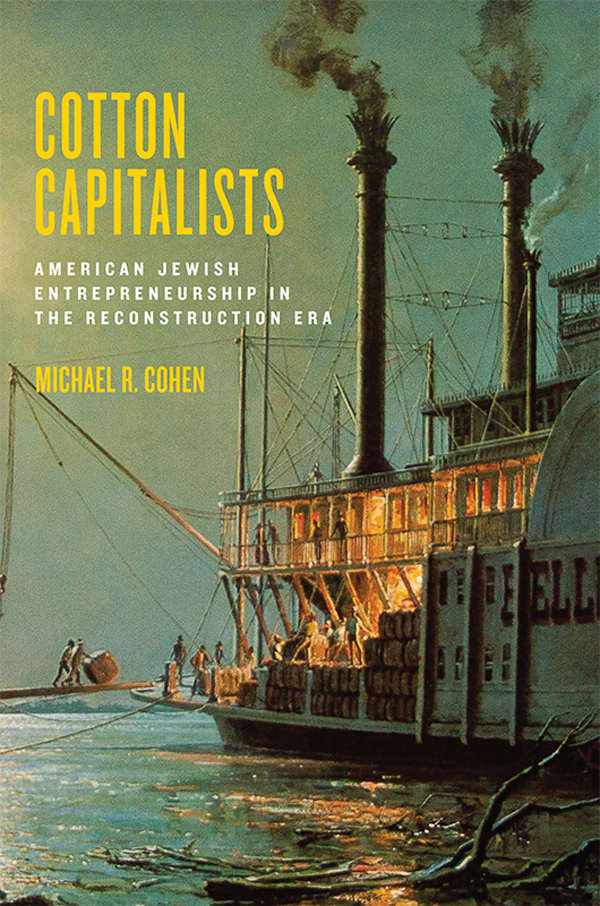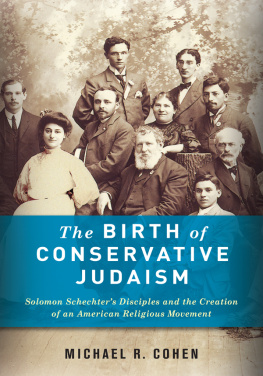
COTTON CAPITALISTS
THE GOLDSTEIN-GOREN SERIES IN AMERICAN JEWISH HISTORY
General Editor: Hasia R. Diner
We Remember with Reverence and Love: American Jews and the Myth of Silence after the Holocaust, 19451962
Hasia R. Diner
Is Diss a System? A Milt Gross Comic Reader
Edited by Ari Y. Kelman
All Together Different: Yiddish Socialists, Garment Workers, and the Labor Roots of Multiculturalism
Daniel Katz
Jews and Booze: Becoming American in the Age of Prohibition
Marni Davis
Jewish Radicals: A Documentary History
Tony Michels
1929: Mapping the Jewish World
Edited by Hasia R. Diner and Gennady Estraikh
An Unusual Relationship: Evangelical Christians and Jews
Yaakov Ariel
Unclean Lips: Obscenity, Jews, and American Culture
Josh Lambert
Hanukkah in America: A History
Dianne Ashton
The Rag Race: How Jews Sewed Their Way to Success in America and the British Empire
Adam Mendelsohn
Hollywoods Spies: The Undercover Surveillance of Nazis in Los Angeles
Laura B. Rosenzweig
Cotton Capitalists: American Jewish Entrepreneurship in the Reconstruction Era
Michael R. Cohen
Cotton Capitalists
American Jewish Entrepreneurship in the Reconstruction Era
Michael R. Cohen

NEW YORK UNIVERSITY PRESS
New York
NEW YORK UNIVERSITY PRESS
New York
www.nyupress.org
2017 by New York University
All rights reserved
References to Internet websites (URLs) were accurate at the time of writing. Neither the author nor New York University Press is responsible for URLs that may have expired or changed since the manuscript was prepared.
ISBN: 978-1-4798-7970-0
For Library of Congress Cataloging-in-Publication data, please contact the Library of Congress.
New York University Press books are printed on acid-free paper, and their binding materials are chosen for strength and durability. We strive to use environmentally responsible suppliers and materials to the greatest extent possible in publishing our books.
Manufactured in the United States of America
10 9 8 7 6 5 4 3 2 1
Also available as an ebook
For Shira
CONTENTS
LIST OF FIGURES
LIST OF MAPS
ACKNOWLEDGMENTS
I owe a large debt of gratitude to friends and colleagues who have shaped this project from the start. Jonathan Sarna helped from beginning to endfirst inspiring me to undertake this research, and then providing valuable comments throughout. Adam Mendelsohn and Rebecca Kobrin both read the penultimate draft and assisted me through countless conversations as I formulated my argument and narrowed my scope. My discussions with Hasia Diner helped me to situate this project within the field of Jewish history, and my conversations with Sven Beckert helped me to place my work in a broader context within the history of capitalism.
I also benefited greatly from the discussions at the Center for Jewish Historys scholars working group on Jewish economic history, and for that I thank Adam Teller, Derek Penslar, Francesca Trivellato, Jonathan Karp, Susie Pak, Jerry Muller, Judith Siegel, and many others. As I moved into the field of Southern Jewish history, many colleagues helped me to understand the lay of the land, including Stuart Rockoff and Mark Bauman. Special thanks also go to Teri Tillman and Anton Hieke, to whom I am indebted for their valuable feedback on my manuscript.
I am grateful for my Tulane University colleagues in the Department of Jewish Studies, including Brian Horowitz, David Goldstein, Ronna Burger, Sarah Cramsey, Yehuda Halper, Inna Shakster, Allison Mull, and Patrice Nadeau. At Tulane, I have also been incredibly lucky to receive the support of a leadership team that was committed to my success, and I must thank Carole Haber and Scott Cowen for providing me with the space and resources to develop as a scholar.
Because of the significant amount of travel that my archival research required, this project would also not have been possible without the generous financial support that I have received along the way. I received Lurcy and Glick Fellowships from the Tulane University School of Liberal Arts, a Committee on Research grant from the Tulane University Provosts Office, and a Monroe Fellowship from the New Orleans Center for the Gulf South. I also received support through the New England Regional Fellowship Consortium, and a Louisiana Board of Regents Award to Louisiana Artists and Scholars. Generous support also came through Mellon and Sizeler Professorships at Tulane University, and I was a recipient of a subvention grant and a Carol Lavin Bernick Faculty Grant at Tulane.
I am also indebted to the many archives and archivists who made this work possible. The staff at Harvard Business Schools Baker Library welcomed me with open arms to what became my home away from home and provided more support than I ever could have imagined. Particular thanks are due to Katherine Fox, Ben Johnson, Tim Mahoney, Melissa Murphy, Christine Riggle, Liam Sullivan, and Abby Thompson. I also must thank the staff at Tulane University Special Collections, Louisiana State University Special Collections, the New-York Historical Society, the Columbia University Rare Book and Manuscript Library, the California Historical Society, the Library of Congress, and the National Archives. Special thanks are also in order for Mimi Miller at the Historic Natchez Foundation, to Helen Williams and the staff of the West Feliciana Historical Society, and to Gary Zola, Dana Herman and the staff of the American Jewish Archives. It was through an article in the American Jewish Archives Journal that I became convinced that this would become my next book project. Thanks also to the many students who assisted me in my research with this project, including Aaron Silberman, Margaret Abrams, and Sam Furman. Special thanks also to Richard Campanella, who not only designed the maps throughout this volume that allowed me to explain a niche economy to my readers through geographic information systems (GIS), but whose maps also revealed to me the patterns that undergird this study.
My editor, Jennifer Hammer, believed in this project from the start, and she has been essential in seeing it through to completion.
Finally, I must thank my family for all their support. Leonard Nemon, whose knowledge of Civil War history is rivaled only by his wife Nancys, read a full draft of my manuscript and offered superb advice. To my parents Marlene and Bernard Cohen, your support (and editorial hands) have been essential throughout this project and my life, and I couldnt be prouder to have you as parents. My brother, David B. Cohen, served as digital lead on this project and introduced me to the world of the digital humanities. His unique blend of historical scholarship, business analytics, and patience assisted me in creating databases that uncovered the patterns that shaped my manuscript. And finally, a huge debt of gratitude goes to my amazing wife Shira, without whose support this manuscript would not be possible.
Introduction
Upon his arrival at the Port of New Orleans in late 1845, nineteen-year-old Jewish immigrant Julius Weis boarded a Mississippi River steamship bound for the region at the heart of the United States cotton production. There, he peddled throughout the countryside, later operating a storefront in the bustling Mississippi River port city of Natchez and then opening what would become one of the most successful cotton commission houses in postbellum New Orleans. For Weis, and most others in the cotton economy, economic success was predicated upon credit. While he had the option of fronting cash to furnish his own stock, he could offer far more variety to his customers if he could acquire credit himself, take delivery of goods before the start of the growing season, and sell staples and luxury goods to his customers.
Next page







